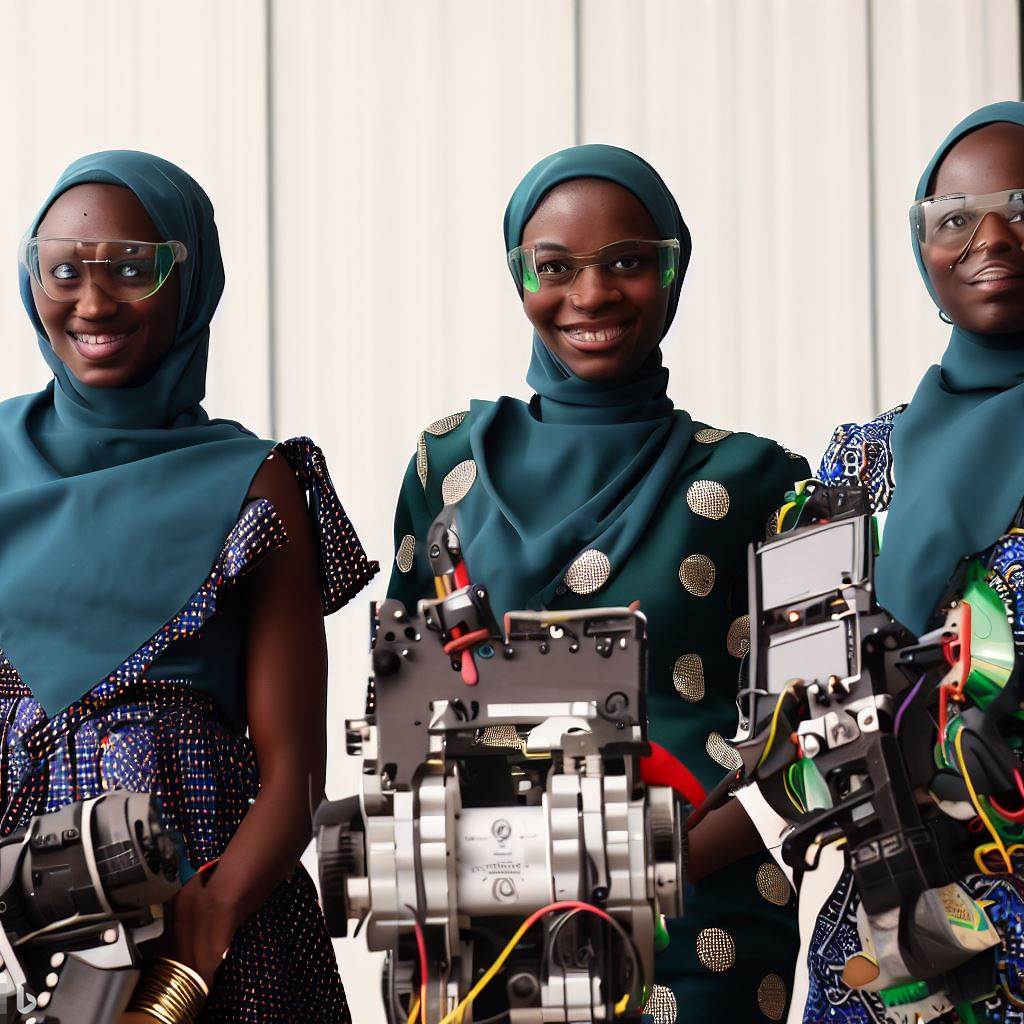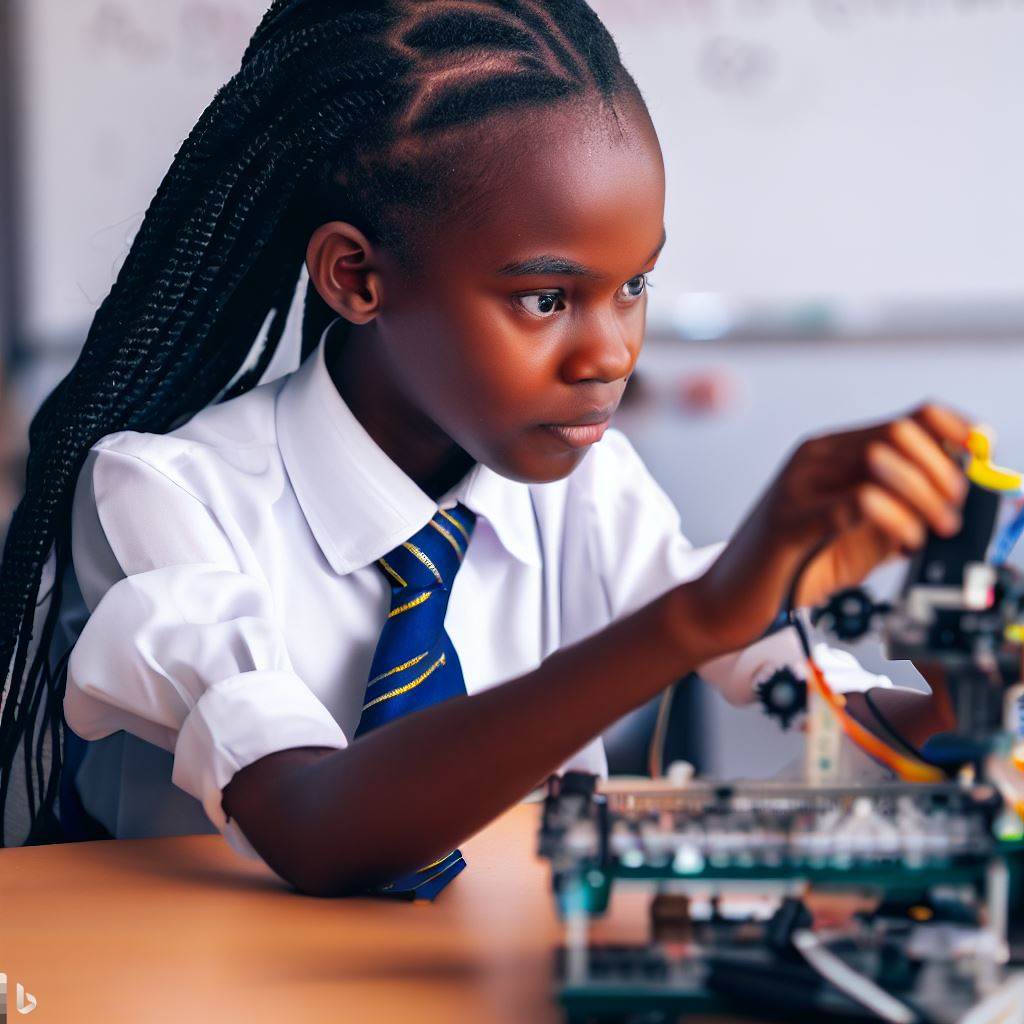Introduction
Discover the dynamic realm of robotics engineering, where women are shaping innovation by crafting, constructing, and coding robots to accomplish diverse objectives.
An inspiring surge in women’s engagement within this field has emerged, marking a substantial shift in recent times.
This blog post delves into the intriguing profiles of Nigerian women who are making remarkable strides in robotics engineering.
Their exceptional contributions stand as a testament to their dedication and brilliance in a traditionally male-dominated domain.
As we unveil their achievements, we celebrate the empowerment and trailblazing spirit of these women, illuminating Nigeria’s journey towards technological excellence.
The Current State of Women in Robotics Engineering
A. Statistics on women’s representation in robotics engineering globally
- Women make up only 12.7% of the engineering workforce worldwide.
- In the field of robotics engineering, women represent an even smaller percentage.
- According to a study by the International Federation of Robotics, only 10% of roboticists are women.
- This underrepresentation of women in robotics engineering is a significant issue that needs attention.
- It is crucial to increase female participation in this rapidly growing and transformative field.
B. Challenges faced by women in pursuing robotics engineering
- Gender biases and stereotypes often discourage women from entering the field of robotics engineering.
- The lack of female role models and mentors in this male-dominated industry hinders women’s progress.
- As a result, women often face isolation and feel inadequate in their pursuit of robotics engineering.
- Furthermore, the work environment can be unwelcoming and demanding, causing additional challenges for women.
- These obstacles create barriers for women who have a passion for robotics engineering.
C. Initiatives and organizations supporting women in robotics engineering
- Various initiatives and organizations have been established to support and empower women in robotics engineering.
- One such initiative is Women in Robotics, a global platform that promotes women’s involvement in this field.
- Other organizations, such as the Association for Women in Science and Women in Engineering, offer support networks and resources.
- Furthermore, universities and institutions are implementing programs to encourage women to pursue robotics engineering.
- These efforts aim to address the gender gap and create inclusive opportunities for women in robotics engineering.
Ada Nwosu: Pioneering Women in Robotics Engineering
A. Background and Education
- Ada Nwosu, a brilliant robotics engineer, was born and raised in Nigeria.
- She showed an interest in engineering from a young age and excelled in mathematics and science.
- Nwosu completed her undergraduate degree in Electrical Engineering at a prestigious Nigerian university.
- She then pursued her postgraduate studies in Robotics Engineering at a renowned university in the United States.
B. Significant Contributions to Robotics Engineering
- Nwosu has made groundbreaking contributions to the field of robotics engineering.
- She has designed and developed robotic systems for various industries, including manufacturing and healthcare.
- Nwosu’s work has focused on creating robots that can assist in repetitive tasks and improve efficiency.
- Her innovations have greatly benefited industries by increasing productivity and reducing human error.
C. Challenges Faced and Overcoming Gender Barriers
- As a woman in a male-dominated field, Nwosu has faced numerous challenges throughout her career.
- She encountered skepticism and reluctance from colleagues who doubted her abilities.
- Nwosu was also subjected to gender bias, with some people questioning her suitability for robotics engineering.
- Despite these barriers, Nwosu remained determined and worked hard to prove her competence and expertise.
- She actively sought opportunities to showcase her skills and knowledge, gradually earning respect and recognition.
- Nwosu became a role model for aspiring female engineers, demonstrating that gender should not limit one’s potential.
- She actively promotes gender equality and encourages young women to pursue careers in robotics engineering.
- Nwosu’s success has inspired other women to overcome societal barriers and excel in the field.
- She believes that diversity in robotics engineering is crucial for innovation and progress.
- Nwosu’s perseverance and accomplishments have garnered international recognition.
- She has received numerous awards and accolades for her contributions to the field.
- Nwosu continues to push boundaries and explore new frontiers in robotics engineering.
In short, Ada Nwosu is a pioneering woman in the field of robotics engineering.
Her background and education provided a solid foundation for her groundbreaking contributions.
Despite facing gender barriers, Nwosu’s determination and resilience allowed her to overcome challenges and excel in her career.
She serves as an inspiration to other women in the field and actively promotes gender equality.
Nwosu’s significant contributions have advanced robotics engineering and continue to propel the industry forward.
Read: Influence of Foreign Tech on Nigerian Robotics Engineering

Funmi Jaiyeola: Breaking Stereotypes in Robotics Engineering
A. Background and journey into robotics engineering
- Funmi Jaiyeola, a Nigerian woman, defied societal norms by pursuing a career in robotics engineering.
- She displayed an early interest in science and technology, often tinkering with gadgets and building models.
- With the support of her parents, who encouraged her passion, she pursued a degree in electrical engineering.
- During her studies, Jaiyeola discovered her fascination with robotics and embarked on a journey to specialize in the field.
- She overcame numerous challenges, including limited resources and gender biases prevalent in Nigeria, to pursue her dreams.
B. Notable innovations and achievements in the field
- Jaiyeola’s dedication and hard work paid off when she became the first Nigerian woman to create a fully autonomous robot.
- Her robot, equipped with advanced artificial intelligence, showcased the potential of robotics in various industries.
- She also developed a robotic prosthetic limb, revolutionizing the field of medical technology and improving the lives of amputees.
- Jaiyeola’s innovations garnered international recognition and earned her prestigious awards and accolades.
- Her work not only pushed the boundaries of robotics engineering but also opened doors for other women in the field.
C. Inspiring other girls to pursue robotics engineering through mentorship
- Recognizing the importance of representation, Jaiyeola actively mentors and inspires young girls interested in robotics engineering.
- She believes that providing guidance and support can help break down gender barriers and foster inclusivity in STEM fields.
- Jaiyeola conducts workshops and outreach programs, introducing girls to the world of robotics and encouraging their participation.
- Through her mentorship initiatives, she aims to ignite a passion for robotics and empower girls to pursue their dreams.
- Jaiyeola’s efforts have already inspired a new generation of girls to defy stereotypes and pursue careers in robotics engineering.
By breaking stereotypes and achieving remarkable feats in robotics engineering, Funmi Jaiyeola has become a role model for aspiring women in Nigeria.
Her journey serves as a testament to the power of determination and resilience in pursuing one’s passion, regardless of societal expectations.
Jaiyeola’s innovations have not only contributed to the field of robotics but also improved lives and opened doors for further advancements.
Through her mentorship programs, she continues to inspire and encourage other girls to follow in her footsteps, creating a more diverse and inclusive future in robotics engineering.
Read: Role of Robotics in Nigeria’s Healthcare Improvement
Success Stories of Women in Nigerian Robotics Engineering
A. Profiles of other accomplished women in robotics engineering
- Funmi Oyatogun – A robotics engineer at the forefront of using robotics for sustainable agriculture.
- Uche Elendu – Founder of a robotics company that designs affordable robotic limbs for amputees.
- Ada Nduka Oyom – Pioneering research in robotics for healthcare applications, aiming to improve patient care.
B. Their contributions to the field and impact on society
- Funmi Oyatogun developed an innovative robot that efficiently harvests crops, reducing manual labor and increasing agricultural productivity.
- Uche Elendu’s affordable robotic limbs have empowered many amputees, improving their quality of life and fostering inclusivity.
- Ada Nduka Oyom’s research aims to enhance healthcare delivery by integrating robotics into medical procedures, improving accuracy and efficiency.
C. Importance of highlighting these success stories for encouraging young women
- Showcasing these success stories inspires young girls to pursue careers in robotics engineering.
- It breaks gender stereotypes and promotes the idea that women can excel in STEM fields.
- Young women can gain role models and mentors, motivating them to overcome challenges and achieve success.
- Highlighting these achievements encourages diversity and inclusivity, leading to more innovative solutions in robotics engineering.
- It helps create a supportive community and network for women in the industry, fostering collaboration and growth.
By sharing these profiles and their contributions, we aim to motivate more young women in Nigeria to explore the field of robotics engineering.
By breaking barriers and challenging societal norms, these accomplished women are paving the way for future generations of female engineers.
Read: Establishing Your Robotics Engineering Firm in Nigeria
Efforts to Promote Gender Diversity in Robotics Engineering in Nigeria
A. Nigerian programs or initiatives supporting women in robotics engineering
- W-ROBOT: A Nigerian non-profit organization that aims to empower and support women in robotics engineering.
- Women in Robotics and AI Nigeria (WIRAN): A community-driven platform that connects and uplifts women in robotics and AI.
- STEM-AiD: An educational initiative that provides scholarships and support for young Nigerian women pursuing robotics engineering.
B. Role of educational institutions in fostering gender diversity
- Universities and colleges in Nigeria have started establishing robotics engineering programs to attract women.
- These institutions provide scholarships, mentorship programs, and networking opportunities to encourage female enrollment.
- Educational institutions actively promote inclusivity in their curriculum, fostering an environment for women to thrive in robotics engineering.
C. Benefits of increasing women’s participation in the field
- Diverse perspectives: Women bring unique viewpoints and ideas, leading to more innovative solutions in robotics engineering.
- Sustained growth: Increasing women’s participation can bridge the gender gap and ensure long-term growth in the field.
- Economic empowerment: Empowering women in robotics engineering contributes to economic growth and reduces gender inequality.
- Role models: Seeing successful women in robotics inspires young girls to pursue careers in STEM fields, fostering a generational change.
In Nigeria, the drive for gender diversity in robotics engineering is gaining traction, spearheaded by initiatives like W-ROBOT, WIRAN, and STEM-AiD.
These efforts provide networking, mentorship, and scholarships, propelling more women to embrace robotics engineering.
Educational institutions play a pivotal role, establishing dedicated programs to attract female students.
Scholarships and mentorship programs are tailored to support women. Inclusive curricula cultivate an environment fostering women’s excellence.
Women’s increased involvement in robotics engineering yields manifold benefits.
Diverse perspectives yield innovative solutions, crucial for pioneering technologies. Bridging the gender gap ensures sustained growth.
Empowering women in robotics engineering is economically potent, harnessing untapped talent for growth. It combats gender inequality by offering equal access to lucrative careers.
Crucially, it cultivates role models. Female successes inspire young girls, igniting a cycle of generational transformation.
In sum, Nigeria propels gender diversity in robotics engineering through initiatives and inclusive education, reaping diverse perspectives, growth, economic empowerment, and inspiring role models.
“Women in Robotics Engineering” catalyze an inclusive and innovative future.
Read: Career Growth Plan for Robotics Engineers in Nigeria
Conclusion
A. Summary of the blog post’s main points
In this blog post on “Women in Robotics Engineering: Profiles from Nigeria,” we highlighted the accomplishments and experiences of Nigerian women in the field.
We discussed their inspirational stories, academic achievements, and industry impact.
B. Encouragement for women interested in robotics engineering
To all aspiring women in robotics engineering, this blog post showcases how Nigerian women have overcome challenges and excelled.
Take inspiration from their stories, believe in your abilities, and pursue your passion for robotics engineering.
C. Call-to-action to support and empower women in the field of robotics engineering
It is crucial that we actively support and empower women in the field of robotics engineering.
Let us create inclusive environments, provide equal opportunities, and promote diversity. Encourage young girls to explore STEM fields and mentor them along their journey.
Together, we can break barriers and bridge the gender gap in robotics engineering. Let’s contribute to a future where women play a significant role in shaping technology and innovation.




